Libya and Middle East uprising - live updates
This page will update automatically every minute: On | Off
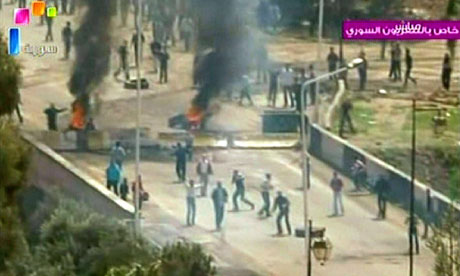
An image grab from Syrian state television allegedly shows scenes of clashes in the town of Deraa. Photograph: AFP/Getty Images
Evening summary
• Nato refused to apologise for an attack on Libyan rebel forces in the east of the country in which at least five people were killed, saying it had not been told the rebels had tanks. The attack on Wednesday between the towns of Brega and Ajdabiya killed at least five rebel fighters. • Witnesses said at least 17 people were killed in the southern Syrian city of Deraa, the focal point of protests against President Bashar al-Assad. In the east, thousands of ethnic Kurds demonstrated for reform and there were also protests in the western city of Homs and in the capital, Damascus.
• Tens of thousands of Egyptians held a mock trial of Hosni Mubarak in Tahrir Square in support of demands to prosecute the former president, his family and his top aides for alleged corruption. It was one of the largest rallies in Egypt since Mubarak stepped down two months ago.
• President Ali Abdullah Saleh of Yemen rejected a mediation offer by Gulf nations that called on him to resign. One man was killed in the southern city of Taiz as more demonstrations were held.
• The US state department has released is 2010 report on human rights around the world. It says popular demands in the Arab world for fundamental freedoms and greater economic opportunity are profound, homegrown, and are being driven by new activists, many of them young people... If they succeed, the Middle East region, and with it the whole world, will be improved.
Rebel forces in Misrata turn to YouTube to deny claims by the Gaddafi regime that they are linked to al-Qaida.
"We are the free rebels of Misrata. We are not as they claim al-Qaida," one says according to a translation by our Arabic-speaking colleague Mona Mahmood."Look at these young men here, they are engineers, doctors and college students. Yesterday Gaddafi's forces tried to get into Tripoli street [in Misrata]. We confronted them. They tried to storm it with a Caterpillar bulldozer. The rebels blew it up. Then, two tanks came and started to shoot at houses, where families were living. This is a piece from the blown-up tank. Thank God, we are the winners. Gaddafi's rats and mercenaries won't scare us."Another man says:
"Behind these containers are the regime's damaged military machines. All of them were destroyed by these young revolutionaries. Our main motive is the liberation of Misrata and Libya. May God wreak revenge on the tyrant."_
Rear Admiral Russ Harding, the British officer who is deputy commander of Nato's Libya operation, said the alliance's jets had carried out 318 sorties and struck 23 targets across Libya in the past 48 hours.
"It would appear that two of our strikes yesterday may have resulted in [rebel] deaths," he told reporters in Naples, where the operation is based.
"I am not apologising. The situation on the ground was and remains extremely fluid and until yesterday we did not have information that [rebel] forces are using tanks."
The protests broke out despite President Assad's pledge to grant citizenship to stateless Kurds.
"It's a new situation in Syria. We saw thousands of people taking to the streets after Friday prayers, from all walks of life: young and old, professionals and not professionals, educated, not educated, there were some Islamists, some nationalists.
He links to this disturbing video apparently taken from inside the mosque.
_
The protest phenomenon has spread across the country - Mubarak supporters might call it the latest plague in the land of Egypt - with people voicing previously stifled demands. Many fear that if they do not capitalize on this moment, the revolution may prove fruitless. Indeed, many worry that it already is.
"People are anxious that this post-revolutionary moment will end without them gaining their rights," said Ehab al-Kharat, a psychiatrist organizing a new party, the Egyptian Social Democratic Party.
The state news agency SANA reported shooting in Deraa, but it said "vandals" had opened fire on mass gatherings, killing a policeman and an ambulance driver and wounding dozens of police and residents.
A number feature on the opposition website Syrian Revolution.
This shows a demonstration near the Rifa'ai mosque, in the capital Damascus. The protesters shout "God, Syria and freedom only," according to our Arabic speaking colleague Mona Mahmood. Security police beat protesters as they left the mosque, according to Reuters.
Another shows a demonstration in the north western town of Homs. After about two minutes protesters appear to start throwing objects at a stone relief of the late authoritarian president Assad.
The protesters refer to the current president as a "coward" and urge him to direct his soldiers towards the occupied territories, rather than protesters. They also pay tribute to protesters killed in Deraa. "We sacrifice our blood and soul you Deraa," they chant.
In this video from the city of Darya thousands of protesters chant about about the "brave Jihadi people of Syria".
Judging by a picture from Tahrir Square posted on yfrog, it looks like a lot of them have ignored the threat.
Incredible. A group of army soldiers joined the protesters minutes ago, were welcomed with huge cheers from the crowd. #Tahrir
Reuters says dozens have been wounded. Citing medical sources, al-Jazeera reports "more than 50 people have been injured as a result of tear gas in Taiz. Ten others were injured by batons or knives. One person has been shot with live ammunition, and is in critical condition."
The extraordinary plot – foiled when suspicious Saudi pilots aborted the air strike – has emerged in one of the classified US embassy cables released by WikiLeaks.
Dated February 2010, the cable illustrates the extent to which relations between Saleh and Ali Mohsen al-Ahmar had deteriorated more than a year before the general declared his support for anti-regime protesters.
The US cable recounts a meeting between James B Smith, the American ambassador in Riyadh, and Prince Khaled bin Sultan, the junior Saudi defence minister. The talks were arranged for Smith to pass on US concerns about Saudi air strikes on the Houthis, a Shia insurgent group in the north of Yemen.
Khaled told the ambassador that targets were selected by a joint committee of senior Saudi and Yemeni officers.
Smith's note continues: "Prince Khaled also reported that the Saudis had problems with some of the targeting recommendations received from the Yemeni side. For instance, there was one occasion when Saudi pilots aborted a strike, when they sensed something was wrong about the information they received from the Yemenis. It turned out that the site recommended to be hit was the headquarters of General Ali Mohsen al-Ahmar, the Yemeni northern area military commander, who is regarded as a political opponent to President Saleh. This incident prompted the Saudis to be more cautious about targeting recommendations from the Yemeni government."
Al-Jazeera reports that at a source told it at least seven people were killed in the southern border town.
It impossible to verify the reports at present.
There are reports of security forces opening fire and using tear gas to disperse protesters in Deraa. Activists say four were killed and that ambulances were prevented from reaching the injured, but the Guardian has so far been unable to independently confirm that.
Douma, which has been seething all week since at least 15 were killed last Friday, has reportedly had phone and internet cut. Similarly to last week, protesters have clashed with security forces in Kafer Souseh, an affluent area of Damascus, and eyewitnesses say a demonstration took place in Harasta, another area of Damascus.
Protesters in Banias are now chanting for Deraa; Jableh has staged a demonstration and residents in Homs have also taken to the streets a day after President Assad sacked the governor who has been a target of protesters' ire.
It seems like today is going to see as many, if not more, people on the streets than last Friday in a growing challenge to Assad who has so far not met the protesters' demands. But with information taking a while to leak out and be verified through amateur footage and calls to eyewitnesses, the full picture will not be clear until later.
"I saw pools of blood and three bodies in the street being picked up by relatives in the Mahatta area," said one of the witnesses, who spoke to Reuters by telephone.
_
Another video from the same YouTube user appears to show more protesters, some of whom are holding up banners.
The poll will go ahead without independent election observers.
Guelleh's opponents had hoped to spark a protest movement but, in the face of a crackdown, backed an independent candidate in the election, Mohamed Warsama.
Human Rights Watch, which was expelled from the country last month, says Guelleh's regime has arbitrarily arrested protesters and opposition leaders.
Rona Peligal, deputy Africa director, said: "The government has trampled on those very rights that make a vote free and fair. Peaceful protests elsewhere in the region are no justification for the government to deny citizens their basic rights."
Reuters reports:
Guelleh, 63, has been in power since 1999 and a change in the constitution in 2010 allowed him to run for a third term, a move that angered opposition leaders.
Just over 152,000 people are registered to vote in the small Red Sea state that is home to the only US military base in Africa plus the largest French army camp on the continent, and is used by anti-piracy naval patrols.
Warsama, 52, is campaigning on a platform of improving the country's judicial system and social services.
"In the absence of Democracy International, and without independent election observers, President Guelleh will try to legitimise the results of the election by making all sorts of wild claims about voter turnout and the percentage of the vote he has received," Abdourahman Boreh, an opposition figure who went into exile in 2009, said in a March 30 statement.
Here's a summary of developments so far today:
• More details have emerged of the Turkish peace plan for Libya. The Turkish prime minister, Recep Tayyip Erdogan, outlined the details of the plan, which envisages a ceasefire, a humanitarian corridor and "a comprehensive democratic change and transformation process that takes into consideration the legitimate interests of all Libyan people". He defended Turkey's stance towards foreign military intervention and insisted his country had "no hidden agenda".
• Protests against Bashar Assad's authoritarian regime have erupted across Syria, including in Douma and Deraa, and the north-eastern Kurdish towns of Qamischli, Amouda and Derbassiyeh. Reports on Twitter suggest security forces have fired on protesters in Dara'a, where thousands of people have gathered in the city where demonstrations against Assad first began three weeks ago. One Tweeter said four people have been killed, according to witnesses.
• Tens of thousands of people have marched against Yemen's president, Ali Abduallah Saleh, in Sana'a, where his supporters also mounted a counter-demonstration. Addressing his supporters, Saleh angrily denounced a deal by the Gulf Cooperation Council that would involve him standing down as "belligerent intervention" and a "coup".
Libyan rebels have deployed tanks, artillery and a helicopter to repel an attack by forces loyal to Col Muammar Gaddafi on the key town of Ajdabiya.
 On close analysis most of his promises are not what they seem, he concludes:
On close analysis most of his promises are not what they seem, he concludes:The crucial question – which may be answered on the streets in the next few days – is how many Syrians believe that Assad is serious about change and able to implement it. They are already long-accustomed to government announcements of reform but less accustomed to seeing them put into practice.
_
Protesters are gathering after Friday prayers in several towns. There are protests reported in the north-eastern Kurdish towns of Qamischli, Amouda and Derbassiyeh, with chants of "Syrians are all one", whilst crowds have once again gathered in Douma and Deraa.
In the coastal city of Banias, eyewitnesses say people are holding olive branches and calling for peace. There are reports of protests in Deir Ezzor, a city in the impoverished eastern region close to the border with Iraq. Residents from there have long complained of a lack of economic development despite the area being home to much of the country's oil and agriculture.
One Kurd says 3,000 people are out in Qamischli - more than he expected. There are security forces there but they have no weapons, he says, whilst there are reports of small attempted protests in other areas being dispersed.
 Photograph: Khaled Abdullah/Reuters The Yemeni president, Ali Abdullah Saleh, has rejected a deal put forward by the Gulf Cooperation Council that involves him standing down in return for immunity from prosecution, according to Reuters. He described the proposal as "belligerent intervention" and said he was opposed to any other country resolving the crisis:
Photograph: Khaled Abdullah/Reuters The Yemeni president, Ali Abdullah Saleh, has rejected a deal put forward by the Gulf Cooperation Council that involves him standing down in return for immunity from prosecution, according to Reuters. He described the proposal as "belligerent intervention" and said he was opposed to any other country resolving the crisis:"They need to respect Yemenis' feelings whether they be friends or brothers ... We reject this coup on the legality of our constitution and on our democracy and freedom," he told supporters in San'a as tens of thousands elsewhere in the capital marched seeking his downfall.Saleh's mercurial character and his handling of crisis is vividly portrayed by Dexter Filkins in the New Yorker, referred to earlier. He describes his appearance at a rally last month when he appeared to be offering concession:
Pro-democracy protesters are holding a "Friday of firmness" in Sana'a, shouting "You're next, you leader of the corrupt," as armoured vehicles and security forces deploy across the city. Some 4km away, tens of thousands of Saleh loyalists were marching, waving pictures of the president and banners that read "No to terrorism, no to sabotage".
While Yemenis offered adoring testimonials, Saleh fidgeted in his chair, repeatedly turning to chat, first with his prime minister and his vice-president, then with a group of aides behind him. Saleh is said to possess a savvy intelligence and the attention span of a teenage boy. Finally, after glancing at his watch, a bejewelled square of violet glass, he rose to speak.
Saleh is a short, stout man, with a thick-necked demeanour and a sandpapery voice. In a speech weeks earlier, he had practically spat at the people assembled before him, vowing to fight the protesters "with every last drop of blood." During a subsequent speech, he laid blame for the protests on the United States and Israel. "There is a control room in Tel Aviv for destabilizing the Arab world," Saleh said. "It is managed by the White House." It was the sort of remark that used to serve him well.
But this time Saleh's tone was soft ...
Yemenis had been debating for weeks whether Saleh would fight like Gaddafi or go peacefully like Mubarak. The consensus seemed to be that Saleh would fall between these extremes, but nobody knew exactly where. He wasn't crazy, but he wasn't a tired old man, either.
Video has emerged appearing to show a protest last night in the city. It shows a crowd of hundreds of people, mostly men, chanting and marching through a street.
_
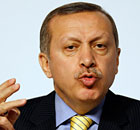 Photograph: Osman Orsal/REUTERS The Turkish prime minister, Recep Tayyip Erdogan, has released a statement concerning his peace plan for Libya. Erdogan says:
Photograph: Osman Orsal/REUTERS The Turkish prime minister, Recep Tayyip Erdogan, has released a statement concerning his peace plan for Libya. Erdogan says:The fundamental purpose of our policy regarding Libya is the creation of necessary conditions to ensure a transition to constitutional democracy in line with the legitimate demands of the people and the preservation of Libya's territorial integrity and sovereignty.Erdogan says "we carry no hidden agenda. Our sole agenda is to guarantee the unity and well-being of Libya." He appeals to his "brothers from Benghazi", assuring them that Turkey criticised the use of force against the Libyan people from the start and condemning "propaganda activities" against Turkey, which has been criticised by some for failing to take a strong enough line against Gaddafi. The Turkish prime minister describes the three elements of the "road map" as follows:
1. A genuine ceasefire should be established immediately and the forces affiliated with Gaddafi should lift the siege they impose on certain cities and withdraw from them.Erdogan concludes:
2. Secure humanitarian zones should be established to provide unimpeded humanitarian aid to all our Libyan brothers indiscriminately.
3. A comprehensive democratic change and transformation process that takes into consideration the legitimate interests of all Libyan people must be launched immediately and urgently. This process should aim at establishing a constitutional democracy in which people would be able to elect their leaders with their free will.
Our people will always stand by the brotherly Libyan people and will work together with our Libyan brothers for the future of Libya.
@Razaniyat
Just now: more than 1500 protest in Qamishli now following Friday prayers in Qasimlo mosque marching towards Hilaliya square. #Syria@wissamtarif
Qamishli is uprising! Chanting "Freedom Freedom" #Syria #March15 #Daraa@Mohammad_Syria
Hundreds of #Kurds are protesting in #Amodah #Hasaka chanting for #Freedom for all Syrians #Syria #mar15
It says the warning comes after videos were posted on YouTube by men purporting to be officers in the Egyptian military publicly challenging the Supreme Council of the Armed Forces.
Meanwhile, protesters in Tahrir Square have unfurled a Syrian flag in solidarity with pro-democracy campaigners there.
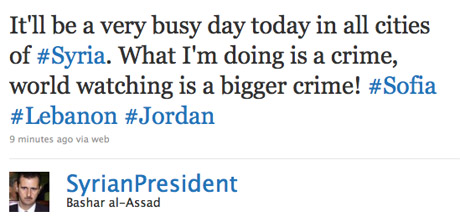 _
_Rear Admiral Russell Harding, the deputy commander of the Nato operation, said Nato had no previous information the rebels were operating tanks.
Nato jets attacked a rebel convoy between Brega and Ajdabiya on Thursday, killing at least five fighters and destroying or damaging a number of armoured vehicles.
Harding said that Nato jets had conducted 318 sorties and struck 23 targets across Libya in the past 48 hours. He said:
It would appear that two of our strikes yesterday may have resulted in (rebel) deaths. I am not apologising. The situation on the ground was and remains extremely fluid, and until yesterday we did not have information that (rebel) forces are using tanks.
There are 200,000 people now stationed outside Sana'a university. If the younger, more frustrated protesters get their way and convince the others that they should march, then we may see an escalation today.
Inside the anti-goverment camp there is an increasing division between the youthful protesters who are saying 'we need to march if we want to get Saleh out of power', and the members of opposition parties who are saying 'we don't need to see any more violence we just need to stay put'.
The political opposition has long been a divided bunch. Islamist, Socialists, and Nasserites, who have struggled to reach a consensus and over the last few years have gained very little out of political negotiations with the president. Now with all this unrest they suddenly have this new found power ... They are not going to accept anything from the president unless he steps down and they get a decent stake in power.
On the Gulf Cooperation Council call for talks and for Saleh to step down under an immunity deal, Tom says:
_
On the streets that has gone down badly, especially at Sana'a university. The idea of the president and all of his relatives all getting off the hook ... is infuriated for these young guys who are seeking justice.
Katherine says although security forces are reported to have withdrawn to the edge of some towns leaving them semi-autonomous, this has happened in preceding weeks, before forces have moved back in to quell protests on Fridays - with the use of lethal force. And she says that opposition attempts to widen the protests have been unsuccessful so far.
Demonstrations are expected across Syria again today - the fourth successive Friday of protests against the regime of Bashar al-Assad. Thousands are expected to gather in the southern city of Deraa and the Damascus suburb of Douma, where huge crowds gathered last week and at least 15 were shot dead. Numbers are likely to be bolstered by residents from surrounding towns and villages, some of which held their own protests yesterday.
The Kurdish town of Qamischli in the north-east is likely to see gatherings again this week despite a last ditch effort yesterday by president Bashar al-Assad to quell unrest by offering nationality to 200,000 Kurds currently classed as "foreigners".
Some Kurdish leaders have already rejected the move, expressing doubt that it would signify an end to decades-long political and cultural repression of Syria's largest non-Arab ethnic minority, about 10% of Syria's population.
In a further round of what have become regular Thursday offers of minimal concessions, Assad fired the governor of Homs, another city likely to stage protests again today. Earlier this week he reversed a ban on niqab-clad teachers in schools and closing a casino in an apparent attempt to appease conservative Muslims. "He is reaching out to everyone but the people protesting" said an activist in Damascus. "This is causing unrest to grow." No announcement has yet been made on lifting the 48-year-old emergency law – a central demand of protesters.
In an attempt to raise pressure on Assad, activists have been trying to mobilise crowds in central Damascus and the northern town of Aleppo, but so far with little success. Human rights organisations and diplomats say they are watching today closely after what happened in Douma last Friday.
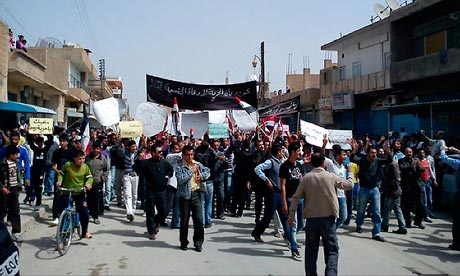 Syrian anti-government protesters in Qamischli last Friday. Photograph: AFP/Getty Images _
Syrian anti-government protesters in Qamischli last Friday. Photograph: AFP/Getty Images _"They tried to advance and enter the city from the eastern side, from an area called Eqseer which is a populated area. The rebels confronted them and clashes are continuing."
Meanwhile, the UN's children agency has said snipers are targeting children in Misrata, AP reports.
Unicef spokeswoman Marixie Mercado told reporters in Geneva the organisation has received "reliable and consistent reports of children being among the people targeted by snipers in Misrata".
She was unable to say how many children have been wounded or killed by snipers in Libya's third-largest city.
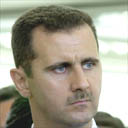 Photograph: AP As in Yemen there are international fears as to the void that would be left if President Bashar Assad is toppled in Syria but hostility to him is growing, says the Economist:
Photograph: AP As in Yemen there are international fears as to the void that would be left if President Bashar Assad is toppled in Syria but hostility to him is growing, says the Economist:Although he is still more likely to opt for repression over rapid reform, as a cycle of protests, funerals and arrests take hold, nobody knows whether he will ride out the trouble or be swept away by it ...
Much will depend on the silent majority of Syria's 22m people, especially its leading businessmen and clerics. So far, governments in the region have sounded sympathetic towards Mr Assad. Qatar's foreign minister, in the forefront of opposition to Libya's Muammar Qaddafi, visited Mr Assad as an apparent gesture of support. Al Jazeera, the influential Qatar-based satellite television channel, has infuriated Syria's protesters by giving them less airtime or credence than demonstrators in other Arab countries. Western governments, for their part, are wary of what might fill the vacuum if Mr Assad's regime fell. But if the protests persist, especially if they get bloodier, the momentum for radical change could quickly resume.
As officials in both Washington and Sanaa repeatedly reminded me, Yemen is not Egypt: it has virtually no middle class, a weak civil society, a marginal intelligentsia, and no public institutions that operate independently of Saleh. The Yemeni opposition includes notable Islamists, among them Abdul Majeed al-Zindani, a cleric whom the U.S. has designated a terrorist.
A Western diplomat in Yemen said, "O.K., fine, Saleh goes. Then what do you do? There is no institutional capacity—in the bureaucracy, in the military, or in any other institutions in this society—to really step in and pick up the pieces and manage a transition." A failed state in Yemen, coupled with an already anarchic situation in Somalia, could provide Islamist militants with hundreds of miles of unguarded coastline, disrupting the shipping lanes that run from the Suez Canal to the Indian Ocean.
The senior Administration official put it bluntly: "Our goal is to help prevent a coup or a usurpation of power by Muslim Brotherhood types or by Al Qaeda."
About 3,000 Egyptians are protesting in Cairo's central Tahrir Square holding banners and signs demanding prosecution of ousted president Hosni Mubarak and his regime.
One speaker in the square has vowed, "We are not leaving here until Mubarak is on trial," as the crowd chants, "The people want to try the deposed president."
Activists have called for a large gathering Friday to push for prosecutions of key members of the former regime, including Mubarak and his family, who are now under house arrest at a presidential palace in the Red Sea resort of Sharm el-Sheikh.
The four, including James Foley from the Global Post, were taken at gunpoint by Gaddafi's forces who emerged from the desert earlier this week. Chris says:
In terms of the tactics of actually snatching them, it is a bit of a first. This is unusual in terms of taking reporters, however Gaddafi's forces have been using these tactics against the rebels. The question now is what has happened to them and where they are. It has been four days. Previously when reporters have been arrested by Gaddafi's forces it took three or four days for them to pop up in Tripoli. It is those three or four days that are crucial."On claims that a Nato air strike yesterday killed a number of rebels, Chris says:
On the Turkish peace plan, Chris says:
"The rebels on the ground said it was an air strike that hit tanks that had been deployed to the frontline for the first time. These are tanks that were seized from Gaddafi so from the air they would have been indistinguishable. Communications have been quite bad between the rebels on the ground and Nato, so it was quite possible that the pilot was unaware that the rebels had tanks or that they had moved them to the frontline. The rebel leadership tried to claim this was a result of an attack by Gaddafi's airforce. That seemed unlikely partly because of the no-fly zone ...
The mood here is quite anti-Nato at the moment. After yesterday's strike it is not merely seen as an accident by many people. Some people are starting to see some kind of conspiracy. The rebel leadership is quite concerned at the idea that Nato becomes isolated and criticised, because they are relying on it very heavily."
_
"Elements of it the rebels will welcome. The rebels not only want Gaddafi's forces out of the cities but free political activity. The problem the rebels will have is that it does not require an immediate departure of Gaddafi and his family from power."
A midday march in the centre of Douma drew about 2,000 people, said Wissam Tarif, a human rights activist who was in the town on Thursday. Several thousand more came to pay their respects to the families of those killed, including a delegation of several hundred students from Damascus University. Mr Tarif said many of those in Douma appeared to have come from outside the city.
Ammar Abdulhamid, a Syrian novelist and opposition figure who now lives in Maryland and has helped young activists in Syria to organize, said that security forces had largely withdrawn from the towns where the largest protests had taken place. Inside the security cordon that now surrounds Deraa, where Syria's popular protests first began three weeks ago, the town itself has become "semiautonomous," he said.
Dara'a, Baniyas and several Damascus suburbs are effectively under the control of the residents, Mr Abdulhamid said. "We used to call them the poverty belt, and now we call them the revolution belt," he said of the towns surrounding Damascus, the capital.
Good morning. Welcome to the Guardian's live coverage of events in the Middle East.
The battle to oust Muammar Gaddafi rages on in Libya. Meanwhile ordinary people throughout the Middle East continue to protest for democratic reform but authoritarian rulers continue to resist change and to use violence to crackdown on peaceful demonstrations. Here's a summary of the latest developments:Libya
Turkey has proposed a peace plan it is taking to Gaddafi. The plan consists of a ceasefire in the cities surrounded by Gaddafi's forces, a humanitarian corridor and negotiations leading to a new political process including free elections.Four foreign journalists have been taken prisoner in Libya. They were taken while reporting on the outskirts of Brega. They are James Foley from the Global Post, Clare Morgana Gillis, an American freelance journalist, Manu Brabo, a Spanish photographer, and Anton Hammerl, a South African photographer.
No comments:
Post a Comment